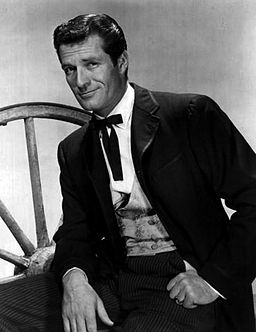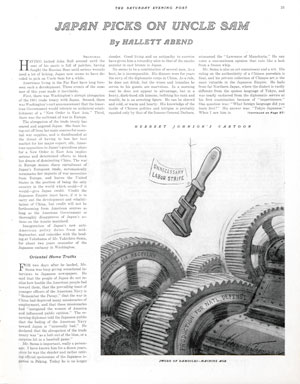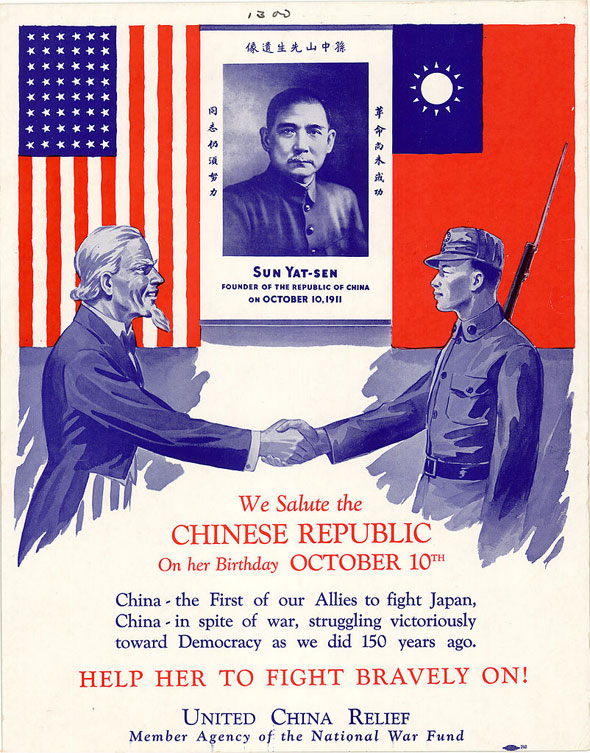News of the Week: Hugh O’Brian, Hand Soap, and the History of Uncle Sam
RIP Hugh O’Brian and Jon Polito

By ABC Television (eBay itemphoto frontphoto back) [Public domain], via Wikimedia Commons
If you watched any television in the past 35 years, you knew Jon Polito. He guest-starred on numerous shows, including Seinfeld (he was landlord in the episode where Kramer and Newman reverse their peepholes), Modern Family, Miami Vice, The Equalizer, NYPD Blue, Murder, She Wrote, and too many others to mention. He was also a regular on Crime Story, Ohara, and Homicide and appeared in such movies as Stuart Little, Highlander, The Tailor of Panama, and Big Eyes. He was also a common sight in Coen brothers movies, like The Big Lebowski, Barton Fink, The Hudsucker Proxy, The Man Who Wasn’t There, and Miller’s Crossing.
Polito passed away from cancer at the age of 65.
Mom Was Right: Just Use Regular Soap and Water
If you’re like me, you wash your hands a few times a day with antibacterial soap. Turns out, we’ve probably been fooling ourselves for the past few decades.
Not only do scientists say that antibacterial soaps aren’t any more effective than regular soaps, they might actually be harmful. The FDA is giving companies one year to get rid of products that contain triclosan and triclocarbon, along with 17 other antibacterial chemicals currently found in the soaps. Of course, most companies will just reformulate their products, so we probably won’t notice any difference unless we read the ingredient list.
Interestingly, the ban will not include antibacterial soaps used in hospitals.
Back to School!
This week marked the return of kids to school. Sorry kids!
Actually, some kids started school in August. As I mentioned last year, I can’t imagine doing that. It just wouldn’t feel right. When I was a kid in Massachusetts, we started school after Labor Day, and that is still true today.
Philip Gulley has a really nice piece about the kids going back to school — how the neighborhood is quieter when they’re back in class and how school has changed since he was a kid. And here’s a series of covers from The Saturday Evening Post and The Country Gentlemen that show how much dogs hate school.
A Worrrrrrrld of Pure Imagination
Last week, Gene Wilder passed away, and many publications and websites gave tributes. One of them was The New Yorker, which ran a Willy Wonka-themed cartoon that nobody understands. Slate actually came up with 38 things that are wrong with the cartoon.
Sure, the cartoon is easy to “get,” but it still doesn’t make any sense. Was the cartoonist on deadline and had to get something done quickly? It’s just odd and lame. I mean … dankyougene?!
https://youtube.com/watch?v=PZhs7w-FzeI
This Week in History: Star Trek Debuts
Star Trek — or as it’s known in fandom, Star Trek: The Original Series — debuted on September 8, 1966. It was almost canceled after two seasons, but a fan campaign saved it and it lasted for one more season. Little did they know that it would lead to so many spinoffs, so many movies, so many comic books and action figures and conventions that are still going strong all these years later.
A new series, Star Trek: Discovery, will premiere on CBS’s All-Access streaming network in January 2017 (after debuting on the CBS broadcast network).
This Week In History: The United States Becomes “Uncle Sam” (September 7, 1813)
The nickname “Uncle Sam” has been used for a very long time, but how many people actually know how the U.S. got that moniker? No one is 100% sure, but evidence points to it being named after New York meat packer Samuel Wilson during the War of 1812. Then again, “Uncle Sam” is mentioned in the lyrics of the Revolutionary War-era song “Yankee Doodle,” though it’s not clear if those lyrics refer to the United States or to something else.
This Week in History: Japanese Bomb Oregon (September 9, 1942)
Yes, I’m as surprised as you are. I never thought the Japanese had bombed the continental United States during World War II, but it actually happened. A Japanese plane, piloted by Nobuo Fujita, dropped bombs in western Oregon in order to start major forest fires.
Fujita actually came back to Oregon several times, to plant trees and dedicate the spot where he dropped the bombs. His trip was paid for by donations in Brookings, Oregon, and later he paid for several residents to visit Japan.
Believe it or not, this wasn’t the only event in Oregon involving a Japanese bomb. In May of 1945, school children found a Japanese balloon in the woods, and as they were dragging it out, a bomb attached exploded, killing five students and their pregnant Sunday school teacher.
National Honey Month
I never think about honey. I never buy it and never really think about making anything with it. If I do consume honey, it’s from foods I buy that already have honey in them. It’s so sticky I hate using it.
But September is National Honey Month so don’t let my frustrations stop you from making these recipes! Here’s one for Grilled Peaches with Mascarpone and Honey, and here’s one with the intriguing name Zion Canyon Lavender Pound Cake.
That might make for a good afternoon snack when the kids get home from school. They’ll dankyou for it.
Next Week’s Holidays and Events
Patriot Day (September 11)
Where were you on 9/11/01? I was at a Barnes & Noble when someone asked me if I had heard what happened. I ran over to Sears and watched the TV coverage with several other shoppers.
POW/MIA Recognition Day (September 16)
This day honors people who were prisoners of war or are still missing in action.
Big Whopper Liar Day (September 17)
Hey, did I ever tell you about the time I created Star Trek?
Japan Turns Against the U.S.
When Japan crossed the Manchurian border to invade China in 1937, it expected an easy conquest. But two year later, its army had fallen far behind schedule, and success was nowhere in sight.

“Japan has thrown her full military strength into China and has not been able to clinch a victory,” Hallett Abend reported. (“Japan Picks On Uncle Sam,” November 25, 1939) “Nor has she been able to make any profit from the venture. The expenditure of manpower and of money goes on and on, and seems destined to continue indefinitely. Japan cannot accept blame for this failure — some other power must be made a villain for the piece.”
The imperial Japanese government needed foreign enemies to remain in power Since the 1920s, it had become increasingly totalitarian, dedicated to growing its empire through military conquest. But its plans for conquest required a firm hold on power at home. By asserting that foreign governments were planning to conquer Japan, the government could keep the state in a permanent state of readiness. Foreign threats also justified suppressing democratic opponents in the government and forcing more of the population into military service.
Russia had been an attractive enemy. (The two countries had remained at odds since Japan had emerged as the surprise victor in the 1905 Russo-Japanese war.) The Soviet army in Siberia presented a constant threat to Japan’s armies just across the border in Manchuria. In 1938, the two countries had fought a battle over this border. When they clashed again in 1939, the Russians soundly defeated the Japanese who now kept a safe distance from the Soviet army.
Great Britain, the dominant colonial power in Asia, was a natural enemy. And now British interests in China were complicating Japan’s attempt to sweep across the country. And in the Pacific, the British fleet was a serious threat to Japan’s navy.
In 1939, the Japanese identified a new enemy. That year, the U.S. had revoked its 1911 trade agreement with Japan, hoping it could pressure Japan to end its China venture and scrap its New Order program for East Asia. “The abrogation of the trade treaty has scared and angered Japan,” Abend wrote. “She fears being cut off from her main sources for essential war supplies, and is dumfounded at the threat of having to lose her best market for her major export, silk.”

The war in Europe had already hurt Japan’s export market. With European nations busily arming themselves, Japan found it difficult to purchase weapons for its China venture. Meanwhile credit from European sources was drying up, which left the U.S. as its last source for resource. Japan’s reliance on American oil was a point of particular vulnerability. So the Tokyo government decided to push back at the U.S.
The Japanese press, which was strictly controlled by the Imperial government, began running stories about American aggression against Japan, hinting that the U.S. was planning to attack the islands.
“Uncle Sam is now regarded by the Japanese public as the big bad man of the world,” wrote Abend. “No mention is made of the two years of American official patience and forbearance, during which there were more than 600 flagrant violations of American rights and properties in China. The Japanese public has no knowledge of the fact that more than 600 American protests are on file in Tokyo, and that few of these cases have been adjusted. The list grows longer every week.”
Despite its anger at the rape of China, America continued trading with Japan. The U.S. had “overwhelming sympathy” for China, Abend wrote, but it remained committed to neutrality. And American businesses continued selling steel and oil to Japan’s forces.
Abend’s article concludes with an observation I’ve often found in articles of this time, all of which anticipate the climax of Japan’s opposition to the American presence in the Pacific. “only one thing … would drive America to a reluctant abandonment of that neutral attitude. This would be deliberate and intolerable provocation on the part of Japan herself. Common sense should lead Japan to reverse her anti-American campaign.”
As long as Japan could keep buying oil, it wouldn’t want common sense.